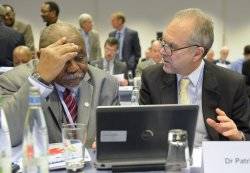The World Health Organization (WHO) has warned that Liberia is set to see a huge spike in infections from the Ebola epidemic ravaging west Africa, with thousands of new cases imminent.
The UN agency on Monday said the country, worst-hit in the outbreak with almost 1,100 deaths, faced "many thousands" of new infections in the next three weeks.
"WHO and its director-general will continue to advocate for more Ebola treatment beds in Liberia and elsewhere, and will hold the world accountable for responding to this dire emergency with its unprecedented dimensions of human suffering," it said in a statement.
The deadliest Ebola epidemic the world has ever seen is spreading across west Africa, with Liberia, Guinea and Sierra Leone the countries worst affected.
The death toll has topped 2,000, out of nearly 4,000 people infected.
Liberia already accounts for about half of all cases and deaths, and "the number of new cases is increasing exponentially", the WHO warned.
Key development partners trying to help Liberia respond to the outbreak "need to prepare to scale up their current efforts by three- to four-fold," it added.
The countries bearing the brunt of the epidemic are among the world's poorest, with dilapidated medical infrastructures that have all but buckled under the strain of trying to contain the virus.
Before the outbreak, Liberia had only one doctor to treat every 100,000 patients in a total population of 4.4 million people.
Now that 152 healthcare workers in the country have been infected and 79 have died, the WHO said the ratio had worsened significantly.
"Every infection or death of a doctor or nurse depletes response capacity significantly," it said.
No treatment bed
The UN body described how taxis filled with entire families, including members suspected of having Ebola, criss-crossed Monrovia "searching for a treatment bed".
"There are none. As WHO staff in Liberia confirm, no free beds for Ebola treatment exist anywhere in the country."
When Ebola patients are turned away from treatment centers, "they have no choice but to return to their communities and homes, where they inevitably infect others, perpetuating constantly higher flare-ups in the number of cases," it said.
In Montserrado county alone, which includes Monrovia, the agency said 1,000 beds were urgently needed to treat Ebola patients.
In the scramble to halt the contagion, some affected countries have quarantined whole regions, while others so far free of the virus have halted flights.
African Union commission chief Nkosazana Dlamini-Zuma called on Monday for travel bans imposed to stem the epidemic to be lifted, "to open up economic activities".
She told a crisis meeting in Addis Ababa there was an urgent need to "craft a united, comprehensive and collective African response" to the outbreak.
But she also warned that in the battle to stop the spread, "we must be careful not to introduce measures that may have more... social and economic impact than the disease itself".
Experts have warned that economic losses caused by the restrictions were adding to the continent's woes, with some arguing that travel bans even slowed medical help getting to affected areas.
PHOTO CAPTION
file photo shows Nigerian representative Ambrose Isah of the Global Advisory Committee on Vaccine Safety (GACVS), left, talking with World Health Organization (WHO) Health Systems and Innovation Medical Officer Patrick Zuber during a WHO conference with international experts in Geneva, Switzerland, on experimental therapies and vaccines with potential to treat or prevent Ebola virus disease.
Aljazeera


 Home
Home Discover Islam
Discover Islam Quran Recitations
Quran Recitations Lectures
Lectures
 Fatwa
Fatwa Articles
Articles Fiqh
Fiqh E-Books
E-Books Boys & Girls
Boys & Girls  Hajj Rulings
Hajj Rulings Hajj Fatwas
Hajj Fatwas














